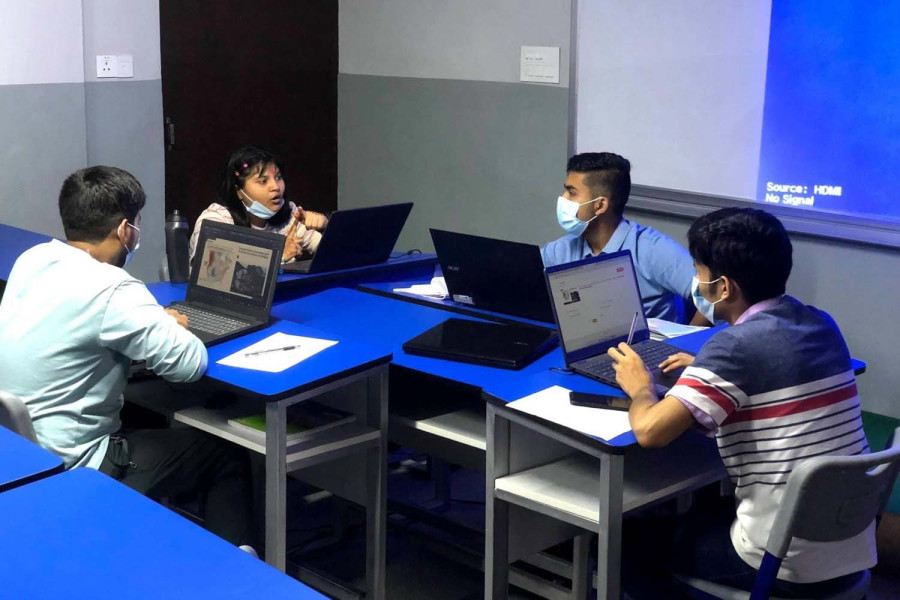Culture & Lifestyle
Gear up for the 2023 National Science Olympiads
Olympiads provide students with conceptual knowledge, collaborative problem-solving skills and a wide range of communication opportunities
Mimamsha Dhungel
International Olympiads are an annual competition in which students of different skill sets compete against each other. These competitions are held worldwide among students of relatively comparable educational levels. They are held on a global and national scale to identify exceptional students who have high potential, talent, aptitude, and intelligence quotient.
The STEM Foundation Nepal is the official national host for ten different international olympiads. The foundation organises regional and national olympiads, with 40 students chosen as finalists. The finalists are trained, and up to six students are carefully selected on merit to represent Nepal in various International Olympiads such as the International Chemistry Olympiad, the International Olympiad in Informatics, the International Biology Olympiad, the International Geography Olympiad, the World Robot Olympiad, the International Junior Science Olympiad, the International Junior Math Olympiad, the International EarthScience Olympiad, the Genius Olympiad, and the Green Olympiad.
Students who have completed their high school and are under the age of 20 are eligible to compete in the olympiads. The International Junior Science Olympiad is open to students in grades lower than 10 (IJSO). IJSO is managed by the Science Teachers' Association of Nepal (STAN) and the STEM Foundation Nepal.
"Everyone knows about the Olympics," says Rinan Pokharel, Chief Executive Officer of STEM Foundation Nepal. " We also have the olympics for science, technology, engineering, and mathematics, known as olympiads, which have a six decades-long world history. Today, up to 90 countries compete in various olympiads each year."
According to Pokharel, olympiads are critical in evaluating the current level of education in each country. Students can learn collaborative problem solving skills. It also gives a huge communication space for students from around the world.
Nepal has won medals in a number of science olympiads. Sarvesh Parajuli recently won the bronze medal in the International Chemistry Olympiad 2022. Gaurav Bhandari also received a bronze medal at the International Earth Science Olympiad 2022. Nitesh Gautam won a bronze in the International Junior Science Olympiad in 2019, and Garima Rokaya won bronze in the International Biology Olympiad in 2020.
"I entered the competition primarily because I am interested in Chemistry," says Parajuli. "Of course, a high score in the olympiad gets you into good colleges, but it was also a great opportunity for me to learn about Nepal's high school curriculum and compare it with that of other countries. This olympiad opened my eyes to the fact that I want to work in Nepal's educational policy sector in the future."
Nepal's education system, according to Parajuli, requires extensive reforms. The olympiads are more than just knowledge tests. In that, they also assess your conceptual understanding of various subjects. "I recommend that everyone should try it out because olympiads teach you how to process information rather than just memorising it like you would in most national exams,” said Pokharel.
"Nepal has tremendous STEM olympiads potential. We are capable of much higher levels of performance. What we lack is an initiative by the government to support these students," Pokharel added.
He said a Rs10 lakh budget has been allocated by the Ministry of Science and Technology for olympiads. However, as matters stand, it is only being used for the International Physics Olympiad.
Pokharel lamented the fact that some merit-based candidates are unable to participate in the science challenge due to financial constraints. "Our national olympiads are held in all major cities such as Biratnagar, Butwal and Pokhara. However, due to financial constraints, Nepal's final delegation is primarily valley-centric."
He said recently, two shortlisted Nepali students were unable to travel to Armenia for the International Biology olympiad due to a lack of funds. “We support the students until registration, but there must be government intervention to ensure that the best and most deserving students are given the opportunity to represent the country.”
Recognising the importance of olympiad representation for students, the provincial governments of Lumbini and Gandaki have allocated budget for it through the STEM Foundation Nepal initiative.
Even so, better government procedures for financially supporting these students who represent Nepal on international platforms are required.
Registrations for the National Science Olympiads is now open, with a deadline of February 28.
Both Pokharel and Parajuli strongly encourage Nepali students from all over the country to register and participate in order to give themselves the opportunity to represent Nepal internationally at the olympiads.




 9.89°C Kathmandu
9.89°C Kathmandu

.jpg&w=200&height=120)













